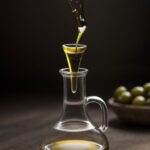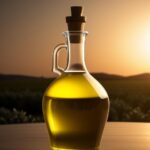Wstęp
Oliwa z oliwek to nie tylko podstawowy składnik kuchni śródziemnomorskiej, ale również symbol zdrowego stylu życia i element kultury kulinarnej Grecji. Produkowana od tysięcy lat, oliwa niezmiennie cieszy się uznaniem za swoje wyjątkowe walory smakowe i prozdrowotne właściwości. Proces jej produkcji jest jednak bardziej skomplikowany, niż mogłoby się wydawać – kluczową rolę odgrywają w nim procesy termiczne, które wpływają zarówno na jakość, jak i smak końcowego produktu.
Produkcja oliwy: od owocu do płynu
Proces produkcji oliwy rozpoczyna się od zbioru oliwek, które są starannie selekcjonowane pod kątem dojrzałości i jakości. Następnie, oliwki są miażdżone, aby uzyskać pastę, z której można wycisnąć cenny olej. W tym momencie zaczynają mieć znaczenie procesy termiczne – temperatura, na którą eksponowane są oliwki podczas tłoczenia, decyduje o finalnej jakości oliwy.
Temperatura podczas tłoczenia
W trakcie tłoczenia oliwy wyróżnia się dwie główne metody: tłoczenie na zimno i tłoczenie na ciepło. W przypadku tłoczenia na zimno, pasta oliwkowa nie jest podgrzewana powyżej 27°C, co pozwala zachować więcej składników odżywczych, jak polifenole, witamina E oraz aromaty typowe dla oliwy z pierwszego tłoczenia. Tłoczenie na zimno jest procesem delikatnym i bardziej czasochłonnym, ale pozwala uzyskać oliwę najwyższej jakości.
W metodzie tłoczenia na ciepło oliwki są podgrzewane, co zwiększa wydajność produkcji, jednak może wpływać negatywnie na smak i wartości odżywcze oliwy. Wysoka temperatura przyspiesza proces oksydacji, co obniża jakość końcowego produktu. Dlatego też oliwa tłoczona na zimno, zwłaszcza extra virgin, jest szczególnie ceniona przez smakoszy i dietetyków.
Wpływ temperatury na jakość i smak oliwy
Temperatura podczas tłoczenia wpływa na zawartość kwasów tłuszczowych oraz profilu smakowego oliwy. Przy zbyt wysokiej temperaturze oliwa może tracić swoje intensywne, świeże aromaty, a w smaku pojawiają się gorzkie lub kwaśne nuty. Niska temperatura pozwala natomiast wydobyć naturalny, owocowy smak oliwek oraz ich łagodną nutę goryczki. To właśnie te cechy sprawiają, że oliwa jest tak ceniona nie tylko w kuchni, ale również jako składnik diety wpływający korzystnie na zdrowie.
Kontrola ciepła w procesie produkcji
Kontrola temperatury to kluczowy element, który wymaga doświadczenia i precyzyjnego podejścia. Współczesne technologie pozwalają na dokładne monitorowanie i regulowanie temperatury na każdym etapie produkcji oliwy. Dzięki temu producenci mogą zagwarantować, że oliwa będzie miała niezmienną jakość, pełnię wartości odżywczych oraz intensywny smak.
Tradycyjne potrawy na bazie oliwy z oliwek
Grecka kuchnia od wieków wykorzystuje oliwę jako podstawowy składnik. Jest ona używana zarówno do smażenia, jak i do dań na zimno, takich jak sałatki czy sosy. Oto przykłady potraw, w których oliwa odgrywa kluczową rolę:
- Horiatiki (grecka sałatka wiejska) – połączenie świeżych warzyw, sera feta i aromatycznej oliwy.
- Saganaki – smażony ser, który podawany jest z dodatkiem oliwy, czasem także cytryną.
- Spanakopita – placek z ciasta filo z nadzieniem ze szpinaku i fety, w którym oliwa pełni funkcję podstawowego tłuszczu.
Podsumowanie
Produkcja oliwy z oliwek to proces wymagający wiedzy, precyzji i dbałości o detale, szczególnie jeśli chodzi o kontrolę temperatury podczas tłoczenia. To właśnie dzięki termicznym procesom możemy cieszyć się oliwą o wyjątkowym smaku i właściwościach zdrowotnych, która jest prawdziwym darem greckiej natury. Grecka kuchnia, wykorzystująca oliwę w wielu tradycyjnych potrawach, pokazuje, że ten złocisty płyn jest niezastąpiony i nieodłącznie związany z kulturą i stylem życia Greków.
Introduction
Olive oil is not only a fundamental ingredient in Mediterranean cuisine but also a symbol of a healthy lifestyle and an integral part of Greek culinary culture. Produced for thousands of years, olive oil is consistently praised for its exceptional taste and health benefits. However, the process of making olive oil is more complex than it might seem – thermal processes play a key role, influencing both the quality and the taste of the final product.
Olive Oil Production: From Fruit to Liquid
The process of producing olive oil begins with harvesting olives, which are carefully selected based on their ripeness and quality. Next, the olives are crushed to create a paste from which the valuable oil can be extracted. At this point, thermal processes come into play – the temperature to which the olives are exposed during pressing determines the final quality of the oil.
Temperature during Pressing
There are two main methods of extracting olive oil: cold pressing and hot pressing. In cold pressing, the olive paste is not heated above 27°C, which helps preserve nutrients like polyphenols, vitamin E, and the characteristic aromas of first-press olive oil. Cold pressing is a delicate and more time-consuming process but results in the highest quality oil.
In hot pressing, the olives are heated, which increases production efficiency, but may negatively impact the taste and nutritional value of the oil. High temperatures accelerate oxidation, lowering the quality of the final product. For this reason, cold-pressed oil, particularly extra virgin, is especially valued by connoisseurs and nutritionists.
The Impact of Temperature on the Quality and Taste of Olive Oil
The temperature during pressing affects the fatty acid content and flavor profile of the olive oil. When the temperature is too high, the oil may lose its intense, fresh aromas, and bitter or sour notes may appear in the taste. A lower temperature allows the natural, fruity flavor of the olives to emerge, along with a mild bitterness. These qualities are what make olive oil highly valued not only in cooking but also as a healthful dietary ingredient.
Heat Control in the Production Process
Temperature control is a crucial element requiring expertise and precision. Modern technologies allow for accurate monitoring and regulation of temperature at every stage of olive oil production. This ensures that the oil maintains consistent quality, full nutritional value, and intense flavor.
Traditional Dishes Using Olive Oil
Greek cuisine has long relied on olive oil as a staple ingredient. It is used for both frying and in cold dishes such as salads and sauces. Here are examples of dishes where olive oil plays a key role:
- Horiatiki (Greek village salad) – A mix of fresh vegetables, feta cheese, and aromatic olive oil.
- Saganaki – Fried cheese served with olive oil, sometimes with lemon.
- Spanakopita – A filo pastry filled with spinach and feta, where olive oil serves as the primary fat.
Conclusion
The production of olive oil is a process that requires knowledge, precision, and attention to detail, particularly when it comes to temperature control during pressing. Thanks to these thermal processes, we can enjoy olive oil with exceptional taste and health benefits, a true gift of Greek nature. Greek cuisine, which uses olive oil in many traditional dishes, demonstrates that this golden liquid is indispensable and inextricably linked to the culture and lifestyle of the Greeks.





